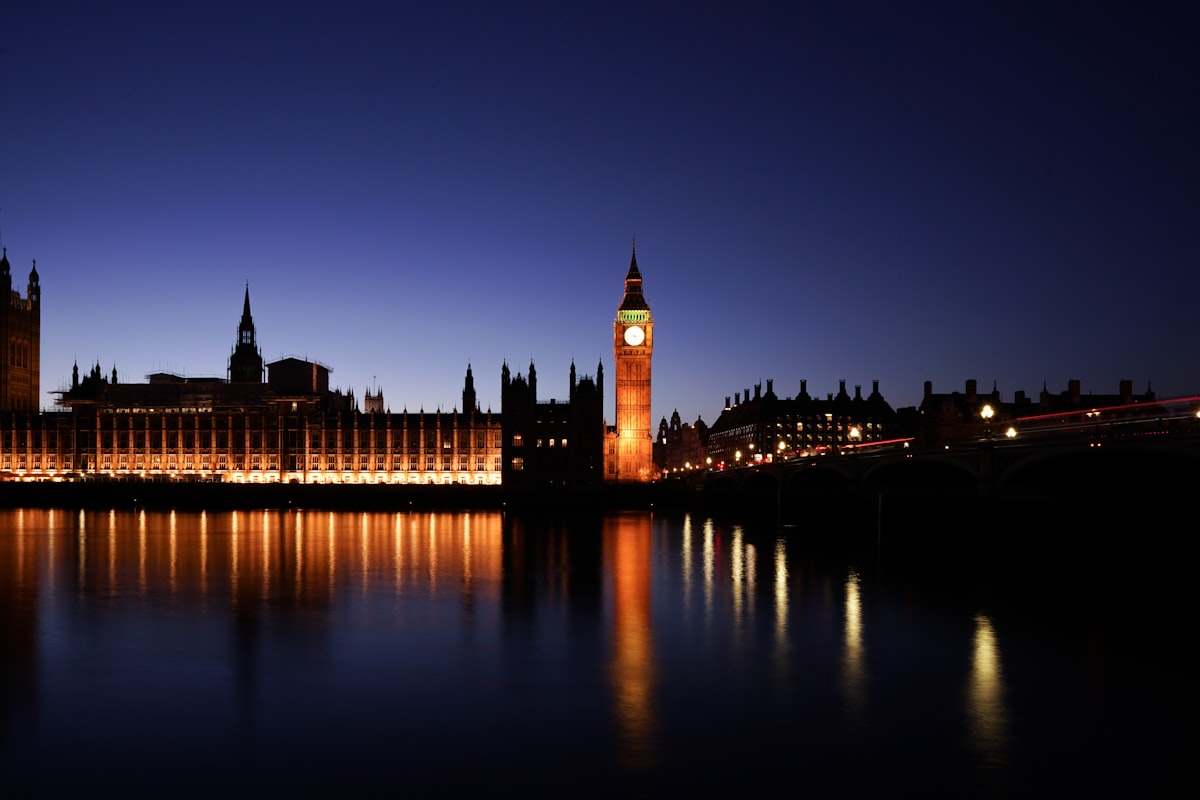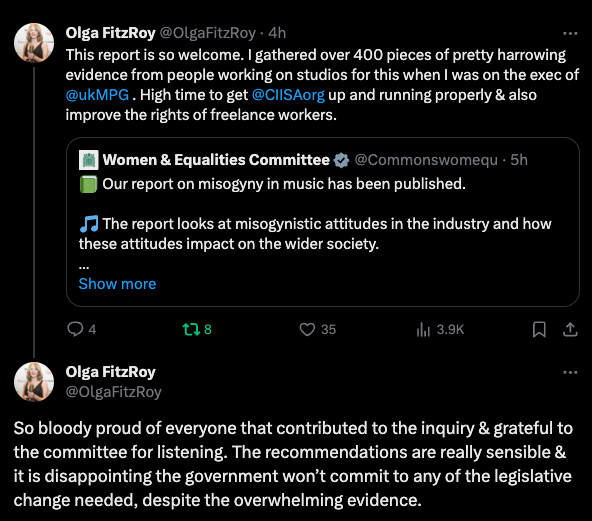Is the tide turning on Misogyny in Music?

The Time's Up tidal wave has reached the shores of the UK music industry... and it will require everyone - from government to executives to security staff to studio owners to music fans - to push for change.
Before getting into the chilling findings of the new government report, I wanted to highlight that there are various brilliant initiatives addressing misogyny, inequality, harassment, bullying, and abuse in the music industry. From whistleblower campaigns to support helplines, you can find lots of resources compiled on the We Are Music website.
For instance, Help Musicians' Bullying and Harassment helpline has been a great help to some friends and colleagues. It's for anyone from musicians to entry level staff to creative collaborators to industry veterans. As they tweeted earlier, "whether you are employed or freelance, nobody should have to put up with intimidating or abusive behaviour. If you work in music, you can call on 0800 088 2045 for confidential support and advice at any time." It's a 24/7 line, and there's lots more info here.
I've also included details of a campaign to confidentially report incidents by the trade union that represents musicians at the end of this email.
Government's "Misogyny in Music" Report Finally Arrives
Following an inquiry that has lasted a year and a half, The Women And Equalities Committee (WEC) have released a report into the "endemic" misogyny in the music industry.
The conclusion of the report, says it all:
Women in the music industry have had their lives ruined and their careers destroyed by men who have never faced the consequences for their actions. Much of the evidence we received has had to remain confidential, including commentary on television shows and household names. That is highly regrettable but demonstrates the extent of the use of NDAs and the culture of silence. People in the industry who attend award shows and parties currently do so sitting alongside sexual abusers who remain protected by the system and by colleagues. The music industry has always prided itself on being a vehicle for social change; when it comes to discrimination, and the harassment and sexual abuse of women, it has a lot of work to do.
Zooming out a little, I was struck by an introduction to this topic by the host of BBC Woman's Hour Emma Barnett:
“...it’s striking that something that gives us so much pleasure, is made in a way that is causing so much pain... what's also striking is that so many don't feel they can speak out due to the freelance nature of their contracts!”
Misogyny in Music is a really thorough seventy-plus page report with 34 recommendations. It spans from the classroom to boardrooms and studios to festivals.
However, it will now likely require musicians and music fans alike to raise our voices for reforms to the law to occur.
For instance, the WEC has recommended that the UK government should legislate to impose a duty of care on employers to protect freelance workers from sexual harassment. This would give everyone across the industry - not just full-time employees - far more rights to a safe working environment (that's a fundamental right... right?!). This change would begin to shift power imbalances in the industry, where everyone from megastar musicians to merch sellers are contractors, with different employment rights than if they were staff.
A SMALL REQUEST
Can you pop 10 mins in your diary to write to your MP in the next few weeks? And encourage others to do so too?
You simply need to ask them to update the Equality Act. Here’s some words to help get you started if you’re short on time:
"I'd like to encourage you to join the campaign to change section 14 of the Equality Act to address intersectional inequality, here's a link to a BBC report about the Misogyny in Music report to read more about why this is important."
This will ensure freelance workers have the same protections from discrimination as employees. You could also urge the government to legislate a duty on employers to protect workers from sexual harassment by third parties and ask them to end NDAs (more on that below).
You can find your MPs details by popping your postcode in here.

More About The Report
Non-disclosure agreements (NDAs) were a focus of the report. They often result in acting like a gag order, which you will likely be aware of if you've followed the various high-profile investigations into various predatory men or watched films like She Said (watch the trailer) about MeToo cases. NDAs essentially rob people of justice and leave them - to quote the report - “threatened into silence”.
The WEC has called on ministers to prohibit the use of NDAs and other forms of confidentiality agreements in cases involving sexual abuse, sexual harassment or sexual misconduct, bullying or harassment, and discrimination relating to a protected characteristic. It has also recommended that the government should consider a retrospective moratorium on NDAs for those who have signed them relating to the issues outlined.
As we've seen the Post Office scandal, abuse of NDAs is something the government really needs to crack down on. Relatedly, I would recommend looking up Can't Buy My Silence, who run a campaign to outlaw the misuse of NDAs.
There's a lot more in the report from unequal pay to the need for more equality initiatives at all levels of the industry, which would radically change the culture of the industry.
One thing that was alarming but not surprising, was the reports findings of high levels of people not reporting incidents of sexual harassment and abuse. From the oral and written evidence, survivors reported that they either were not believed or more often that not, they would see repercussions for their careers rather than the perpetrators’.
Diversity and Inclusion Training, at all levels of the industry, is one of the solutions suggested in the report - although this training is much maligned as being "woke" by the far right and their interconnected web of politicians and male supremacist "influencers".
I'll leave you with some quotes and below this you'll find some bits to read/listen further:
"Our report rightly focuses on improving protections and reporting mechanisms, and on necessary structural and legislative reforms.
However, a shift in the behaviour of men – and it is almost always men – at the heart of the music industry is the transformative change needed for talented women to quite literally have their voices heard and be both recognised and rewarded on equal terms."
Committee chair Caroline Nokes MP
“Several women spoke about the emotional toil of being a musician in the contemporary scene, intensified by what they saw as a comparative undervaluing of women musicians by promoters, agents, and media and the scene’s reliance upon a ‘boys’ club’ network of male individuals to gain access and opportunities”
Sarah Raine, fellow at the School of Music, University College Dublin
“The Misogyny in Music report makes for uncomfortable but sadly unsurprising reading—given my 34 years in the industry I have witnessed, experienced and campaigned against the inequalities and discrimination sadly still faced by women in music. And as one of the ‘relatively few’ women in the upper age bracket I can attest to the many challenges of navigating through and maintaining a successful music career and achieving a leadership position.
It should not still be this hard, here in 2024, for women to be supported to succeed and to be taken as seriously as our male counterparts.
AIM welcomes the recommendations in the report which look to add extra safeguarding measures to protect women whatever their role, with more stringent training and certification for those who work with women to avoid abuse, harassment, sexual assault and bullying. We also welcome the recommendations to provide support for mothers, carers and freelancers.”
Silvia Montello, CEO of the Association of Independent Music (AIM)
"All women should be able to work in a music sector which is free from misogyny and discrimination. The industry must do all it can to ensure there is a supportive and safe working environment and to address any imbalances of power that exist.
The government will carefully consider the Committee's recommendations, and it is right that the industry is taking action through work led by Creative UK and the formation of the Creative Industries Independent Standards Authority."
A government spokesperson
Further reading
- Download the full 72 page report (PDF) | Summaries here
- Listen to the firsst 10 mins of this morning's episode of Woman's Hour on BBC Sounds, featuring The F List's Vick Bain who appeared on the DiS podcast last year
- Learn more about the Musicians' Union Safe Space campaign, which allows you to report instances of sexism and sexual harassment.
- Naomi Pohl who leads the MU discussed the Safe Space campaign last year on the relaunch episode of the Drowned in Sound podcast.
- How Men Can Be Allies - really thought provoking piece by SoundGirls.
- A judge ordered Marilyn Manson to reimburse 'Westworld' actress Evan Rachel Wood for $326,956 at a hearing Monday (Rolling Stone)
- The inquiry heard evidence from people including the former BBC Radio 1 DJ Annie Macmanus, who said there was a "tidal wave" of revelations about sexual assault in the music industry waiting to be told. (BBC)
- Not unrelated: BBC's Newsnight reported a few months ago on the culture of misogyny within Westminister (There's also an MP facing very serious allegations who still has the Conservative Party whip, and until the court backlogs reach his case, he is unable to attend the palace of Westminster).
